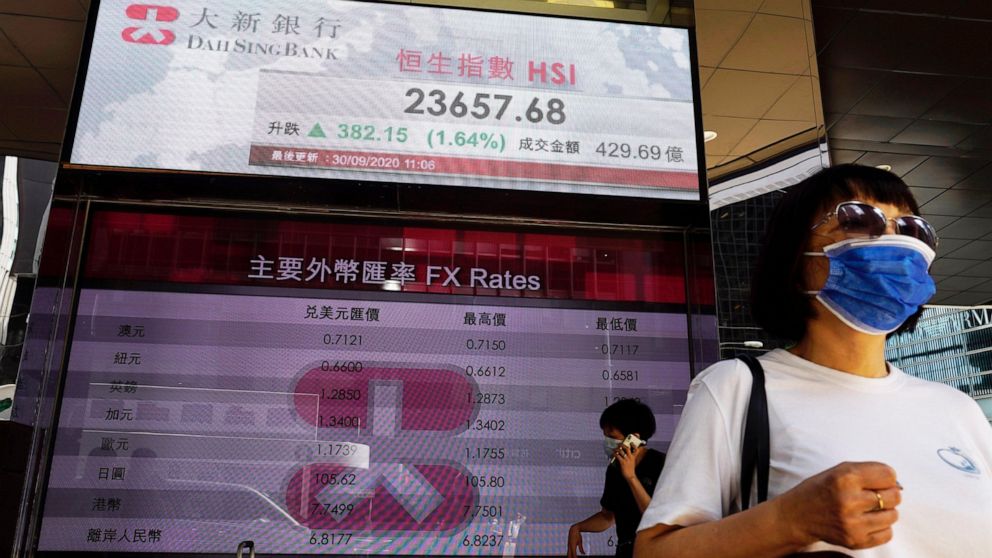Stocks end a bumpy day higher, but still down for September
NEW YORK — Stocks ended another bumpy day higher but still closed out September with their first monthly loss since March. Trading was volatile Wednesday as hopes grew, then faded, that talks between the White House and Congress would result in more aid for the economy. The S&P 500 rose 0.8%, but still lost 3.9% for the month. After setting a record high Sept. 2, the index has been mostly tumbling on a range of worries in its sharpest setback since it began soaring in the spring. Strong showings in the prior two months left the S&P 500 with its second straight quarterly gain.
THIS IS A BREAKING NEWS UPDATE: AP’s earlier story appears below.
Wall Street is rallying Wednesday with rising hope that Washington may break through its partisanship to deliver more aid for the economy.
The S&P 500 was up 1.6% in afternoon trading, though it’s still on pace to close out its first monthly loss since March. After setting a record high on Sept. 2, the benchmark index has been mostly tumbling on a wide range of worries in its sharpest setback since it began soaring in the spring.
The Dow Jones Industrial Average was up 527 points, or 1.9%, at 27,980, as of 2:07 p.m. Eastern time, and the Nasdaq composite was 1.6% higher.
Stock futures and Treasury yields perked up following a stronger-than-expected report on hiring by private employers, which was released before stock trading began on Wall Street. They then accelerated amid revived hopes that the U.S. government could soon offer more support for the economy. Treasury Secretary Steven Mnuchin said at a conference presented by CNBC and Institutional Investor that he will talk with House Speaker Nancy Pelosi again this afternoon, “and I hope we can get something done.”
Investors have been frustrated waiting for Congress to deliver more stimulus after weekly unemployment benefits and other aid it had earlier approved for the economy expired. They have long called such programs crucial for an economy that’s still struggling under the weight of the coronavirus pandemic.
“It has certainly weighed on the markets,” said J.J. Kinahan, chief strategist with TD Ameritrade. “This gives us something a little more concrete to hold on to.”
The number of layoffs sweeping the country has remained stubbornly high, and The Walt Disney Co. said late Tuesday that it plans to lay off 28,000 workers because of government restrictions due to the pandemic that are hurting its theme parks. Other areas of the economy have also seen growth slow since the Congressional aid went away.
“We all knew that the small businessman or restaurant owner was getting hurt, but this takes it to a different level of just how serious it is,” Kinahan said. “It maybe changes the narrative a bit.”
But a report from payroll processor ADP on Wednesday gave some encouragement. It said hiring by private employers accelerated this month, with 749,000 jobs added versus economists’ expectations for 605,000.
That raises hopes for the federal government’s more comprehensive jobs report, which arrives on Friday. For that, economists had been expecting to see hiring slowed to 850,000 from 1.4 million in August.
This month’s jobs report will take on even more importance than usual because it will be the final one released before Election Day in November.
Tuesday night’s debate between President Donald Trump and the Democratic nominee, Joe Biden, was the first of this election season, and it amplified some of the market’s concerns. Trump said it may take months to learn the election’s results, and such a long period of uncertainty could make an already shaky market even more volatile.
But several analysts said they didn’t see the debate having a big effect on the stock market, whose path depends much more on what happens with corporate profits, interest rates and the coronavirus pandemic than who sits in the White House.
“Last night was pretty much a nothing burger from a market perspective, other than perhaps suggesting more uncertainty in the weeks ahead, which could continue to drive volatility,” said Mike Loewengart, managing director of investment strategy at E-Trade Financial.
Trump again lobbed claims of fraud at the voting process, even when the head of the FBI has said there has not been any significant coordinated national voter fraud. The tone was combative through the night, with plenty of insults and talking over one another, and reflective of the country’s deepening partisan divide.
Shares of data-mining company Palantir jumped 47% to $10.67 on their first day of trading. The company was born 17 ago with the help of CIA seed money. Palantir isn’t selling new shares to raise money. Instead, it’s listing existing shares for public trading.
Stocks of airlines and other travel-related stocks rose amid the widespread gains. Norwegian Cruise Line Holdings jumped 2.2%, United Airlines Holdings rose 2.2% and American Airlines Group climbed 2.4%. Across the S&P 500, more than 90% of the stocks were higher.
Despite the gains, the S&P 500 remains on track for a loss of 3.1% for September. Wall Street’s momentum slowed this month amid worries that stocks simply got too expensive following their tremendous run from the spring into summer.
In Europe, Germany’s DAX fell 0.5% Wednesday. The CAC 40 in Paris fell 0.6%, and London’s FTSE 100 shed 0.5%.
In Asia, Japan’s Nikkei 225 lost 1.5%, Hong Kong’s Hang Seng rose 0.8% and stocks in Shanghai slipped 0.2% .
The yield on the 10-year Treasury rose to 0.69% from 0.66% late Tuesday.
———
AP Business Writer Elaine Kurtenbach contributed.
![]()


